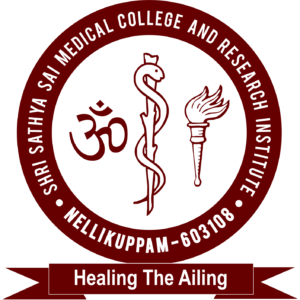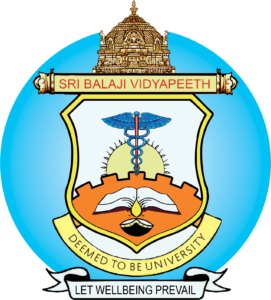TEACHING, LEARNING & ASSESSMENT
Teaching Learning & Assessment
The Teaching-Learning activities targeting both undergraduate and postgraduate students at SSSMCRI has been implemented in an innovative fashion. Apart from the foundation course for I MBBS students, the students have been exposed to an integrated form of teaching-learning. In addition, in order to facilitate early community exposure, students have been subjected to the Health Appraisal by Rapid Techniques (HeART) program, which is an innovation to sensitize students to both quantitative and Qualitative Research.
On a similar note, the students of II MBBS have been subjected to Clinical Research Audit by Medical Students (CReAMS) initiative, wherein the students are oriented about the functioning of the hospital and patient flow. Furthermore, in order to meet the changing needs of the medical students, the institute has adopted various innovative teaching- learning methods (viz. Problem Based Learning, OSCE, Integrated Teaching, etc.). Moreover, realizing the principles of adult learning and the needs of the modern era, the institute has adopted the use of various e-learning tools, like e-portfolio for PG students, Google classrooms, flipped classrooms, whatsapp / facebook learning, etc.
Apart from that, for the Students Needing Additional Curricular Support (SNACS), special classes and mentoring has continued to be practiced for years together. A structured Mentor-Mentee system has been implemented for providing support to the students and it has also been supported by Parent Teacher Meetings. Further, for encouraging students to excel further, the institute has been conducting Shri. M.V. Krishnamoorthy Iyer Gold Medal Exam for the 3 subjects of I MBBS and all the students are being nurtured to bring out their talents in the various academic activities organized in and outside the institute.
In order to encourage the teaching-learning activities for the postgraduate students, they have been asked to maintain e-portfolios to document their learning. Reflective writing has been encouraged and faculty members are giving feedback to complete the cycle of learning. The postgraduate students have been assessed through the assessment of Entrustable Professional Activities and have been graded in each of their academic years in a periodical fashion.
Teaching Learning Methods
Didactic Lectures
Formal lectures would be for only one-third of the total teaching hours. Lecture topics would be published in the SIS-Garuda, well in advance to enable the students to prepare and actively participate and interact during the lecture sessions. Teaching will be predominantly in small groups & student-centric.
Practical/ Demonstration classes
Practical /Demonstration classes are conducted appropriately to cover certain specific areas of the concerned discipline. The students are divided into small batches and hands- on training is provided.
Clinical Classes
Clinical training would be patient-based and will be held as bedside clinics. The Purpose of clinical classes would be to train students in core clinical skills of diagnosis & devising management plans for individual patients. The focus would on a patient-centric approach.
Skills Training Sessions
The students will undergo ‘hands-on’ training in Procedural & Patient Care Skills through the process of Active training under supervision. All SBV students are trained in Basic & Advanced Life Support by the completion of the internship.
Small group teaching / Tutorials
Small group teaching/tutorials would be organized by the faculty members for a small group of students at a time. These sessions would enable extensive interaction between the teacher and the taught and will be based on clinically oriented problems.
Student seminars
This facet of teaching methodology definitely motivates students to learn the subject on their own. These sessions, moderated by a faculty member, ensure active preparation and participation from the students. Simultaneously, they help the learners to gain fair knowledge on the use of audio-visual aids, develop communication skills and boost their self-confidence.
Integrated teaching
This method is useful in helping the students learn the subject in an integrated/holistic manner with the active involvement of and inputs from the faculty of those disciplines. Integrated teaching will be both horizontal and vertical.
Problem Based Learning (PBL) Sessions
PBL is a student-centered pedagogy in which students learn about a concept through the experience of solving an open-ended problem. In this methodology, students learn thinking and teamwork strategies and domain knowledge.
Learning Management System (LMS)
This is a software application for the administration, reporting, and delivery of electronic education technology (also called e-learning). The ‘Ganesha Canvas’, the LMS of SBV, offers lessons, tutorials, tests, assignments, references and clinical problem-solving exercises and more.
Assessment Methods
Students at SSSMCRI are under continuous Formative Assessment (PBL sessions, quizzes, assignments, clinical case discussions, and others). Summative Assessment would also be held (Mid-term, End-of-term, send-up and ward-learning examinations) apart from the University examinations. The actual frequency and format of these examinations is left to the discretion of the Academic Departments. However, the tests /practical & ward-leaving exams will be scheduled in a way to avoid the clash of tests & overcrowding. The drawn up schedule will be published in the Academic Calendar. To ensure the adequacy of training in clinical skills in the early phase, regular formative OSCEs (Objective Structured Clinical Examination) will be held summatively at the end of course i.e. 3rd Sem, 5th Sem, 7th Sem & end of Internship.
The student performance in the Summative Assessment would be used as the basis for calculating the Internal Assessment (IA) marks. Their performance reports will be shared with parents via email notifications and by post regularly.
SBV University Examinations
The University Examinations will be held for theory and practical/ clinical separately. Examinations will be conducted twice a year i.e. June /July / August and November / December/ January. The exact dates for the examinations will be notified in the Academic Calendar.
Practical/Clinical Examinations
Practical/ Clinical exams will be conducted by the respective departments for the marks allotted. Practical examination (pre/para-clinical departments) shall be skill-based testing or OSPE pattern. Clinical examinations will be patient /case-based discussions or OSCE pattern.
A student has to obtain a minimum of 35% marks in the internal assessment in every subject to be permitted to appear for the University examinations in that subject as per the guidelines of the University / MCI.


